PROJ6000: Project Management Principles & Personal Traits Analysis
VerifiedAdded on 2023/04/07
|6
|1029
|261
Report
AI Summary
This report provides an analysis of project management principles, emphasizing the significance of personal and professional traits for effective project managers. It explores traits such as patience, integrity, flexibility, and resilience, illustrating their impact on project outcomes. The analysis includes a case study of Uber to demonstrate practical applications of these principles. The report also offers a critique of the initial analysis, highlighting the importance of team performance and acknowledging the limitations and strengths of individual project managers within a team context. Ultimately, the report underscores the need for project managers to possess a combination of essential character traits and qualities to deliver projects successfully within budget and deadlines, while also focusing on end business results.
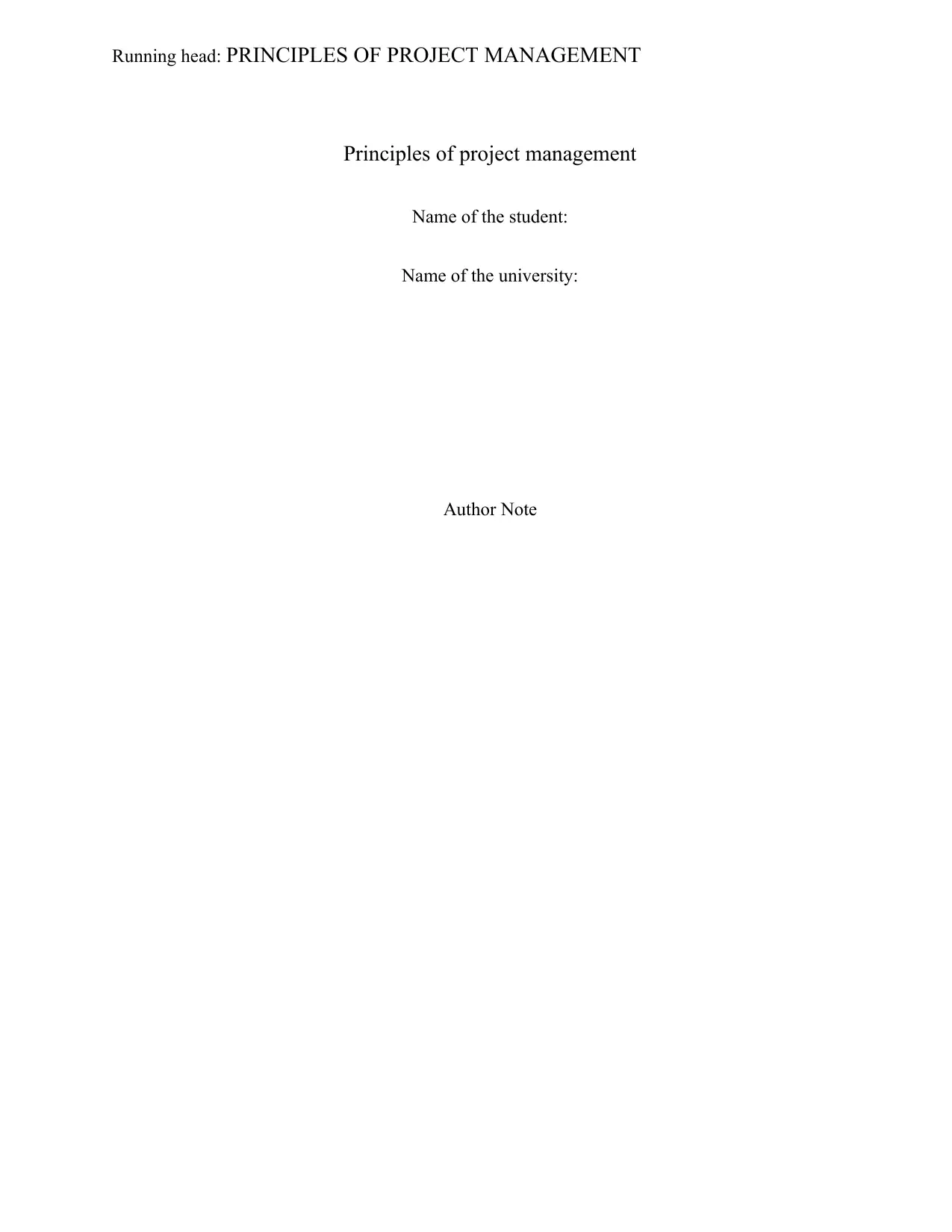
Running head: PRINCIPLES OF PROJECT MANAGEMENT
Principles of project management
Name of the student:
Name of the university:
Author Note
Principles of project management
Name of the student:
Name of the university:
Author Note
Paraphrase This Document
Need a fresh take? Get an instant paraphrase of this document with our AI Paraphraser
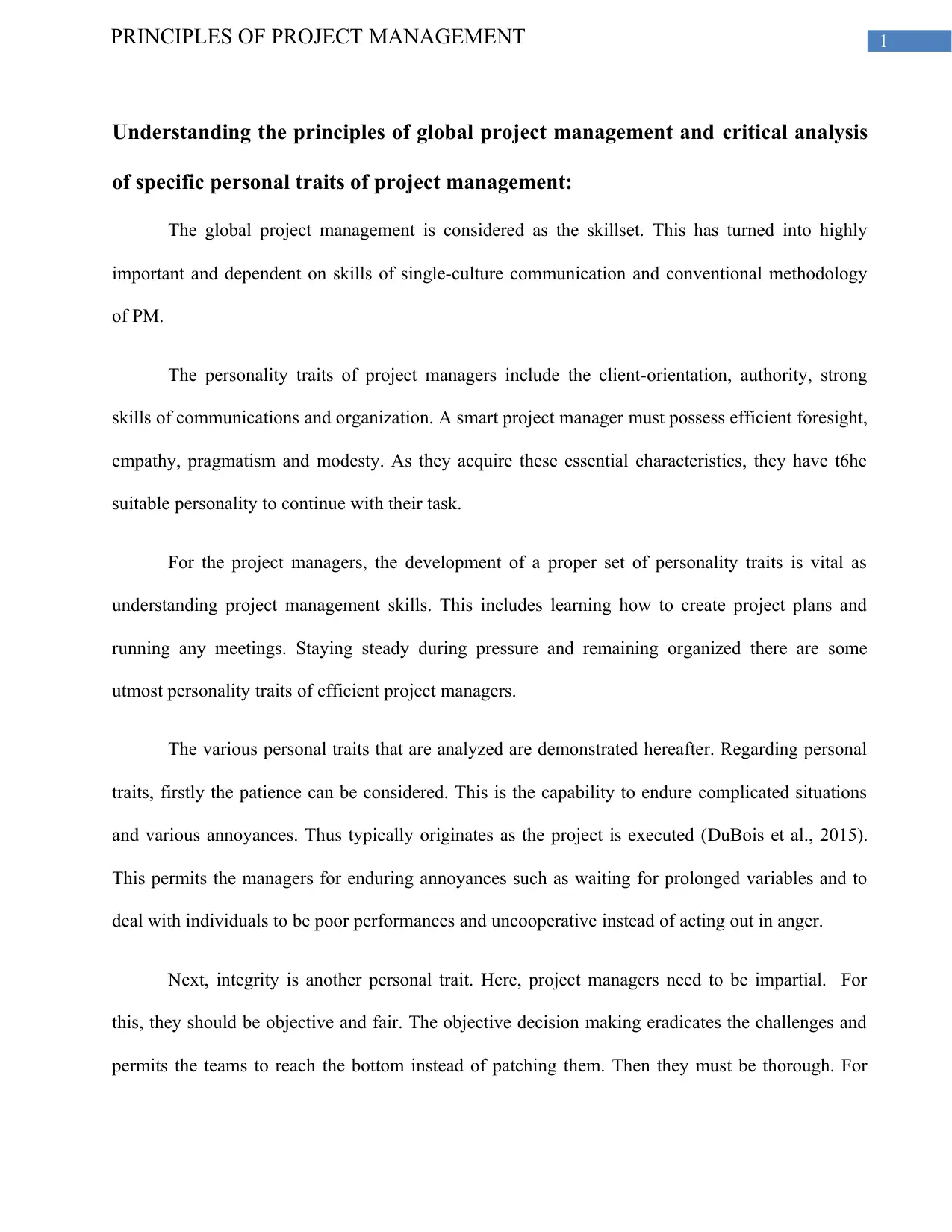
1PRINCIPLES OF PROJECT MANAGEMENT
Understanding the principles of global project management and critical analysis
of specific personal traits of project management:
The global project management is considered as the skillset. This has turned into highly
important and dependent on skills of single-culture communication and conventional methodology
of PM.
The personality traits of project managers include the client-orientation, authority, strong
skills of communications and organization. A smart project manager must possess efficient foresight,
empathy, pragmatism and modesty. As they acquire these essential characteristics, they have t6he
suitable personality to continue with their task.
For the project managers, the development of a proper set of personality traits is vital as
understanding project management skills. This includes learning how to create project plans and
running any meetings. Staying steady during pressure and remaining organized there are some
utmost personality traits of efficient project managers.
The various personal traits that are analyzed are demonstrated hereafter. Regarding personal
traits, firstly the patience can be considered. This is the capability to endure complicated situations
and various annoyances. Thus typically originates as the project is executed (DuBois et al., 2015).
This permits the managers for enduring annoyances such as waiting for prolonged variables and to
deal with individuals to be poor performances and uncooperative instead of acting out in anger.
Next, integrity is another personal trait. Here, project managers need to be impartial. For
this, they should be objective and fair. The objective decision making eradicates the challenges and
permits the teams to reach the bottom instead of patching them. Then they must be thorough. For
Understanding the principles of global project management and critical analysis
of specific personal traits of project management:
The global project management is considered as the skillset. This has turned into highly
important and dependent on skills of single-culture communication and conventional methodology
of PM.
The personality traits of project managers include the client-orientation, authority, strong
skills of communications and organization. A smart project manager must possess efficient foresight,
empathy, pragmatism and modesty. As they acquire these essential characteristics, they have t6he
suitable personality to continue with their task.
For the project managers, the development of a proper set of personality traits is vital as
understanding project management skills. This includes learning how to create project plans and
running any meetings. Staying steady during pressure and remaining organized there are some
utmost personality traits of efficient project managers.
The various personal traits that are analyzed are demonstrated hereafter. Regarding personal
traits, firstly the patience can be considered. This is the capability to endure complicated situations
and various annoyances. Thus typically originates as the project is executed (DuBois et al., 2015).
This permits the managers for enduring annoyances such as waiting for prolonged variables and to
deal with individuals to be poor performances and uncooperative instead of acting out in anger.
Next, integrity is another personal trait. Here, project managers need to be impartial. For
this, they should be objective and fair. The objective decision making eradicates the challenges and
permits the teams to reach the bottom instead of patching them. Then they must be thorough. For
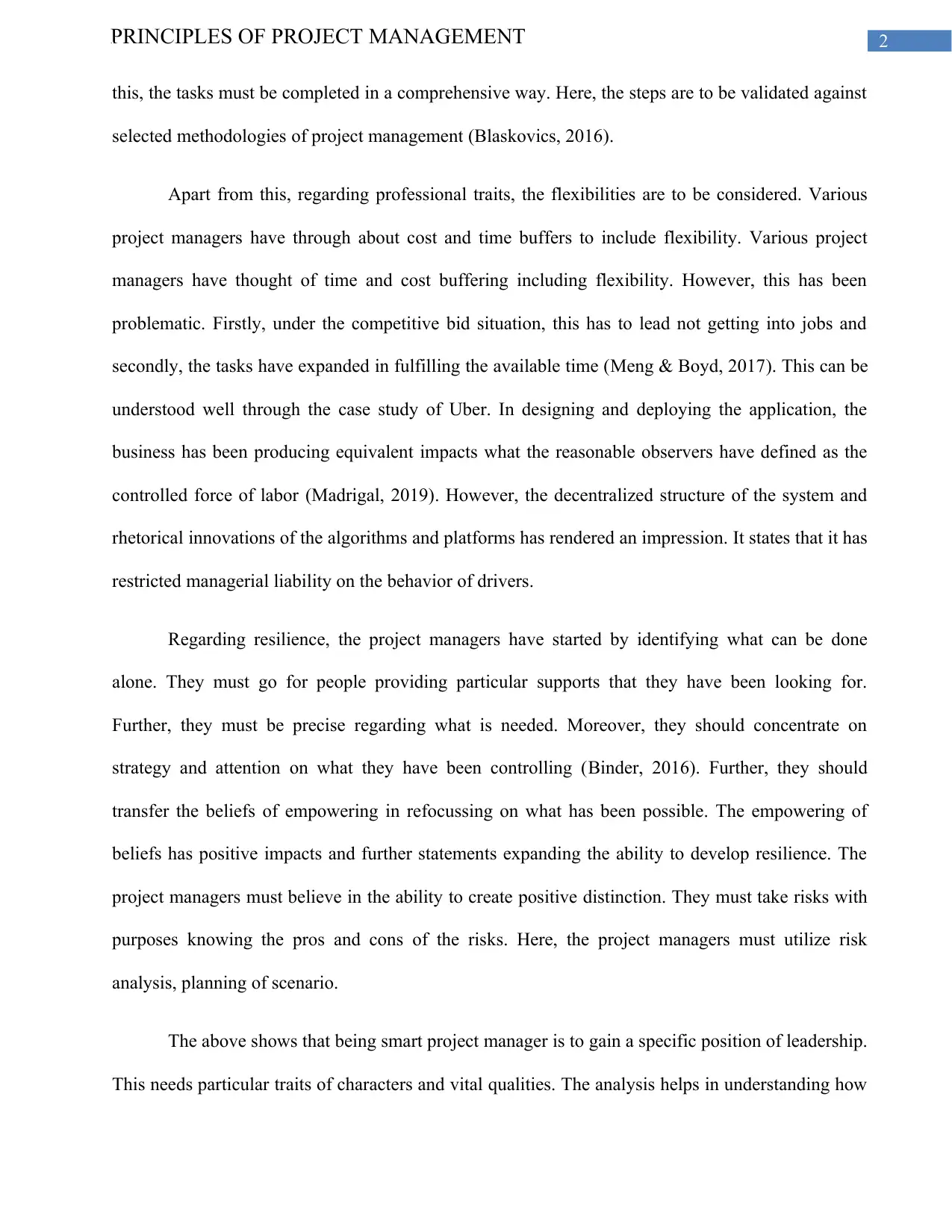
2PRINCIPLES OF PROJECT MANAGEMENT
this, the tasks must be completed in a comprehensive way. Here, the steps are to be validated against
selected methodologies of project management (Blaskovics, 2016).
Apart from this, regarding professional traits, the flexibilities are to be considered. Various
project managers have through about cost and time buffers to include flexibility. Various project
managers have thought of time and cost buffering including flexibility. However, this has been
problematic. Firstly, under the competitive bid situation, this has to lead not getting into jobs and
secondly, the tasks have expanded in fulfilling the available time (Meng & Boyd, 2017). This can be
understood well through the case study of Uber. In designing and deploying the application, the
business has been producing equivalent impacts what the reasonable observers have defined as the
controlled force of labor (Madrigal, 2019). However, the decentralized structure of the system and
rhetorical innovations of the algorithms and platforms has rendered an impression. It states that it has
restricted managerial liability on the behavior of drivers.
Regarding resilience, the project managers have started by identifying what can be done
alone. They must go for people providing particular supports that they have been looking for.
Further, they must be precise regarding what is needed. Moreover, they should concentrate on
strategy and attention on what they have been controlling (Binder, 2016). Further, they should
transfer the beliefs of empowering in refocussing on what has been possible. The empowering of
beliefs has positive impacts and further statements expanding the ability to develop resilience. The
project managers must believe in the ability to create positive distinction. They must take risks with
purposes knowing the pros and cons of the risks. Here, the project managers must utilize risk
analysis, planning of scenario.
The above shows that being smart project manager is to gain a specific position of leadership.
This needs particular traits of characters and vital qualities. The analysis helps in understanding how
this, the tasks must be completed in a comprehensive way. Here, the steps are to be validated against
selected methodologies of project management (Blaskovics, 2016).
Apart from this, regarding professional traits, the flexibilities are to be considered. Various
project managers have through about cost and time buffers to include flexibility. Various project
managers have thought of time and cost buffering including flexibility. However, this has been
problematic. Firstly, under the competitive bid situation, this has to lead not getting into jobs and
secondly, the tasks have expanded in fulfilling the available time (Meng & Boyd, 2017). This can be
understood well through the case study of Uber. In designing and deploying the application, the
business has been producing equivalent impacts what the reasonable observers have defined as the
controlled force of labor (Madrigal, 2019). However, the decentralized structure of the system and
rhetorical innovations of the algorithms and platforms has rendered an impression. It states that it has
restricted managerial liability on the behavior of drivers.
Regarding resilience, the project managers have started by identifying what can be done
alone. They must go for people providing particular supports that they have been looking for.
Further, they must be precise regarding what is needed. Moreover, they should concentrate on
strategy and attention on what they have been controlling (Binder, 2016). Further, they should
transfer the beliefs of empowering in refocussing on what has been possible. The empowering of
beliefs has positive impacts and further statements expanding the ability to develop resilience. The
project managers must believe in the ability to create positive distinction. They must take risks with
purposes knowing the pros and cons of the risks. Here, the project managers must utilize risk
analysis, planning of scenario.
The above shows that being smart project manager is to gain a specific position of leadership.
This needs particular traits of characters and vital qualities. The analysis helps in understanding how
⊘ This is a preview!⊘
Do you want full access?
Subscribe today to unlock all pages.

Trusted by 1+ million students worldwide
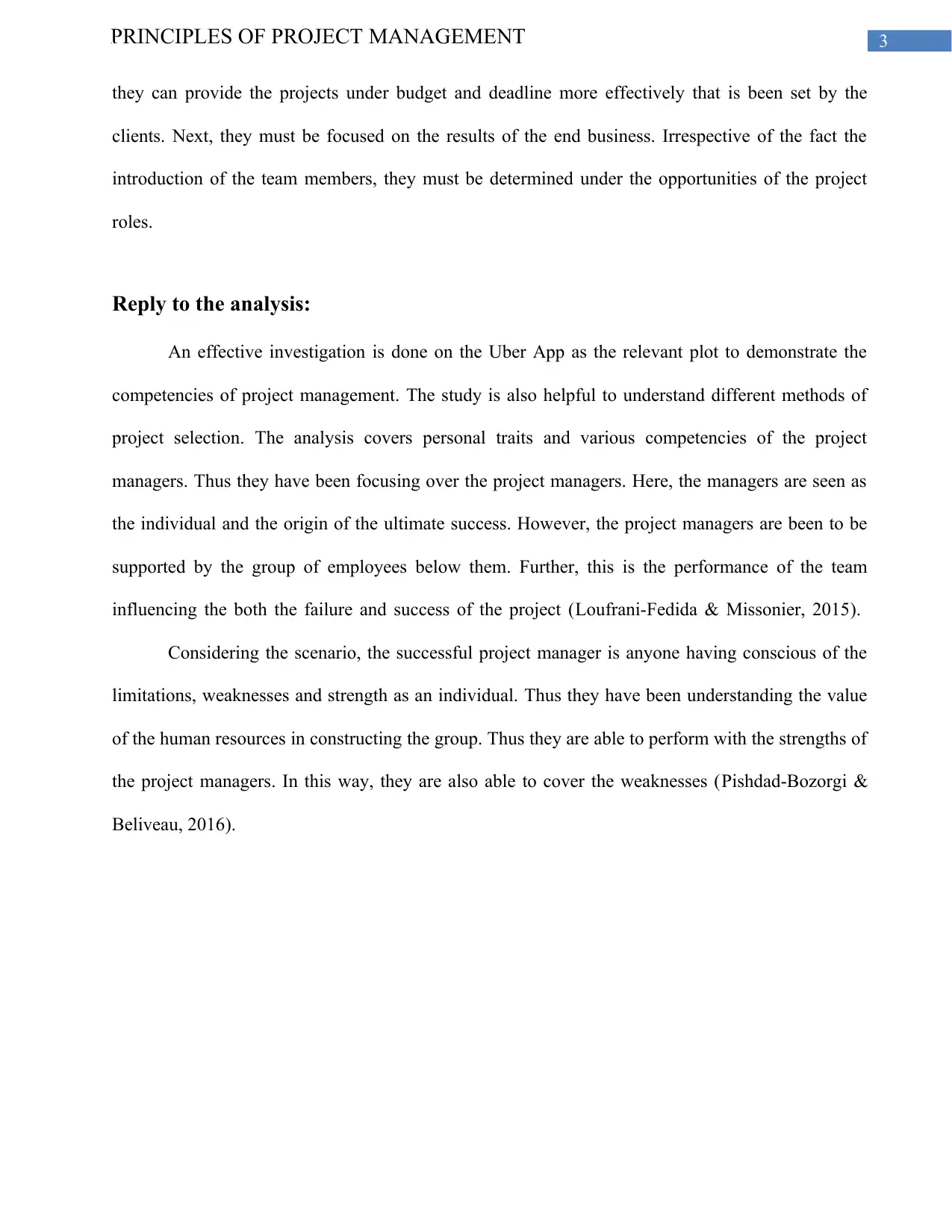
3PRINCIPLES OF PROJECT MANAGEMENT
they can provide the projects under budget and deadline more effectively that is been set by the
clients. Next, they must be focused on the results of the end business. Irrespective of the fact the
introduction of the team members, they must be determined under the opportunities of the project
roles.
Reply to the analysis:
An effective investigation is done on the Uber App as the relevant plot to demonstrate the
competencies of project management. The study is also helpful to understand different methods of
project selection. The analysis covers personal traits and various competencies of the project
managers. Thus they have been focusing over the project managers. Here, the managers are seen as
the individual and the origin of the ultimate success. However, the project managers are been to be
supported by the group of employees below them. Further, this is the performance of the team
influencing the both the failure and success of the project (Loufrani-Fedida & Missonier, 2015).
Considering the scenario, the successful project manager is anyone having conscious of the
limitations, weaknesses and strength as an individual. Thus they have been understanding the value
of the human resources in constructing the group. Thus they are able to perform with the strengths of
the project managers. In this way, they are also able to cover the weaknesses (Pishdad-Bozorgi &
Beliveau, 2016).
they can provide the projects under budget and deadline more effectively that is been set by the
clients. Next, they must be focused on the results of the end business. Irrespective of the fact the
introduction of the team members, they must be determined under the opportunities of the project
roles.
Reply to the analysis:
An effective investigation is done on the Uber App as the relevant plot to demonstrate the
competencies of project management. The study is also helpful to understand different methods of
project selection. The analysis covers personal traits and various competencies of the project
managers. Thus they have been focusing over the project managers. Here, the managers are seen as
the individual and the origin of the ultimate success. However, the project managers are been to be
supported by the group of employees below them. Further, this is the performance of the team
influencing the both the failure and success of the project (Loufrani-Fedida & Missonier, 2015).
Considering the scenario, the successful project manager is anyone having conscious of the
limitations, weaknesses and strength as an individual. Thus they have been understanding the value
of the human resources in constructing the group. Thus they are able to perform with the strengths of
the project managers. In this way, they are also able to cover the weaknesses (Pishdad-Bozorgi &
Beliveau, 2016).
Paraphrase This Document
Need a fresh take? Get an instant paraphrase of this document with our AI Paraphraser
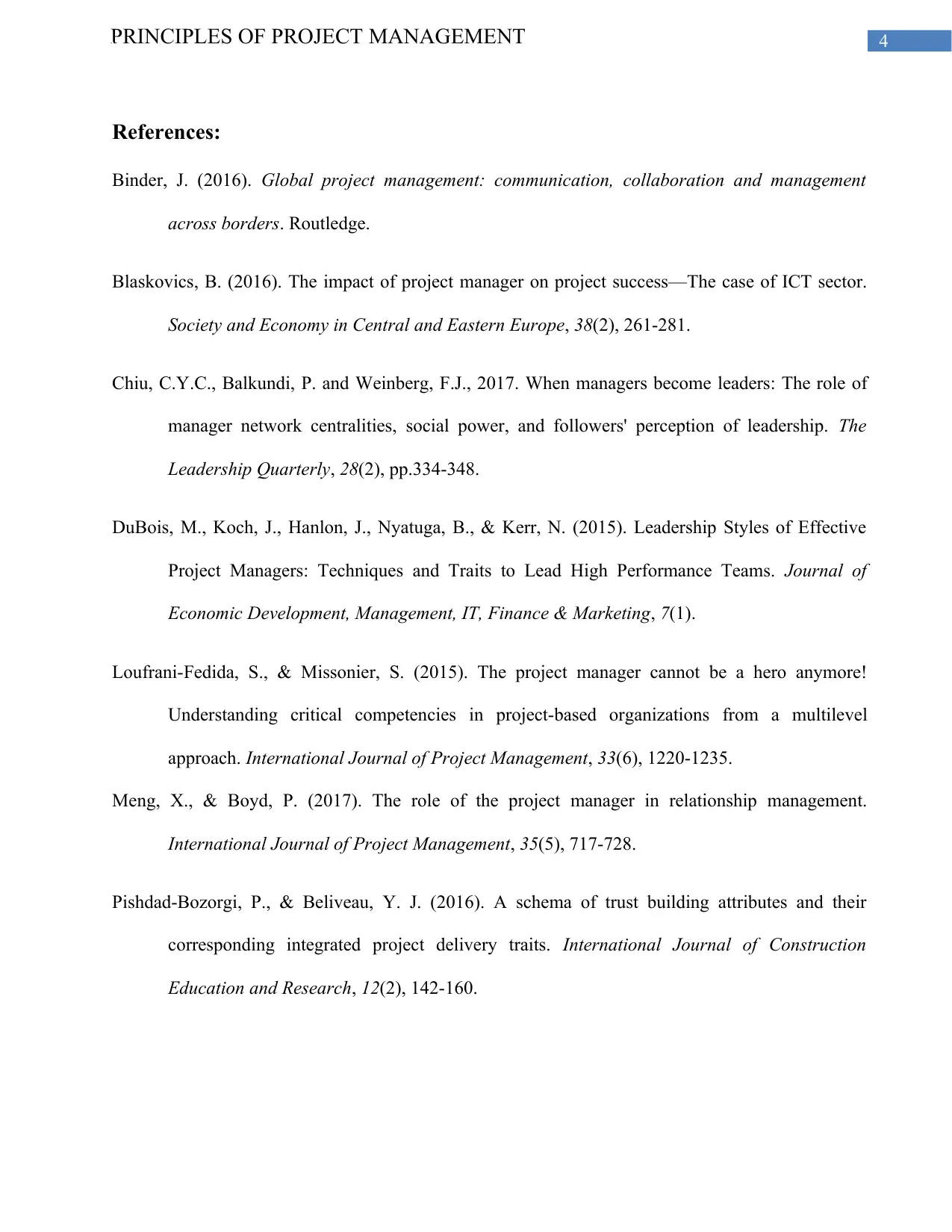
4PRINCIPLES OF PROJECT MANAGEMENT
References:
Binder, J. (2016). Global project management: communication, collaboration and management
across borders. Routledge.
Blaskovics, B. (2016). The impact of project manager on project success—The case of ICT sector.
Society and Economy in Central and Eastern Europe, 38(2), 261-281.
Chiu, C.Y.C., Balkundi, P. and Weinberg, F.J., 2017. When managers become leaders: The role of
manager network centralities, social power, and followers' perception of leadership. The
Leadership Quarterly, 28(2), pp.334-348.
DuBois, M., Koch, J., Hanlon, J., Nyatuga, B., & Kerr, N. (2015). Leadership Styles of Effective
Project Managers: Techniques and Traits to Lead High Performance Teams. Journal of
Economic Development, Management, IT, Finance & Marketing, 7(1).
Loufrani-Fedida, S., & Missonier, S. (2015). The project manager cannot be a hero anymore!
Understanding critical competencies in project-based organizations from a multilevel
approach. International Journal of Project Management, 33(6), 1220-1235.
Meng, X., & Boyd, P. (2017). The role of the project manager in relationship management.
International Journal of Project Management, 35(5), 717-728.
Pishdad-Bozorgi, P., & Beliveau, Y. J. (2016). A schema of trust building attributes and their
corresponding integrated project delivery traits. International Journal of Construction
Education and Research, 12(2), 142-160.
References:
Binder, J. (2016). Global project management: communication, collaboration and management
across borders. Routledge.
Blaskovics, B. (2016). The impact of project manager on project success—The case of ICT sector.
Society and Economy in Central and Eastern Europe, 38(2), 261-281.
Chiu, C.Y.C., Balkundi, P. and Weinberg, F.J., 2017. When managers become leaders: The role of
manager network centralities, social power, and followers' perception of leadership. The
Leadership Quarterly, 28(2), pp.334-348.
DuBois, M., Koch, J., Hanlon, J., Nyatuga, B., & Kerr, N. (2015). Leadership Styles of Effective
Project Managers: Techniques and Traits to Lead High Performance Teams. Journal of
Economic Development, Management, IT, Finance & Marketing, 7(1).
Loufrani-Fedida, S., & Missonier, S. (2015). The project manager cannot be a hero anymore!
Understanding critical competencies in project-based organizations from a multilevel
approach. International Journal of Project Management, 33(6), 1220-1235.
Meng, X., & Boyd, P. (2017). The role of the project manager in relationship management.
International Journal of Project Management, 35(5), 717-728.
Pishdad-Bozorgi, P., & Beliveau, Y. J. (2016). A schema of trust building attributes and their
corresponding integrated project delivery traits. International Journal of Construction
Education and Research, 12(2), 142-160.

5PRINCIPLES OF PROJECT MANAGEMENT
⊘ This is a preview!⊘
Do you want full access?
Subscribe today to unlock all pages.

Trusted by 1+ million students worldwide
1 out of 6
Related Documents
Your All-in-One AI-Powered Toolkit for Academic Success.
+13062052269
info@desklib.com
Available 24*7 on WhatsApp / Email
![[object Object]](/_next/static/media/star-bottom.7253800d.svg)
Unlock your academic potential
Copyright © 2020–2026 A2Z Services. All Rights Reserved. Developed and managed by ZUCOL.





